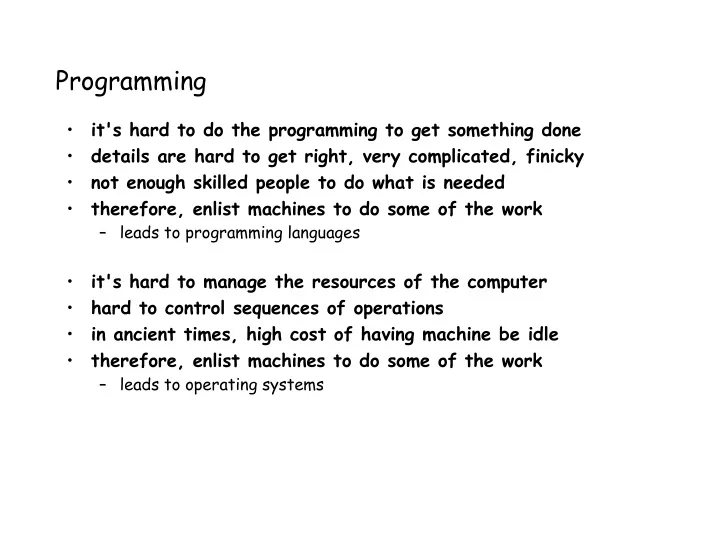

Programming • it's hard to do the programming to get something done • details are hard to get right, very complicated, finicky • not enough skilled people to do what is needed • therefore, enlist machines to do some of the work – leads to programming languages • it's hard to manage the resources of the computer • hard to control sequences of operations • in ancient times, high cost of having machine be idle • therefore, enlist machines to do some of the work – leads to operating systems
Evolution of programming languages • 1940's: machine level – use binary or equivalent notations for actual numeric values • 1950's: "assembly language" – names for instructions: ADD instead of 0110101, etc. – names for locations: assembler keeps track of where things are in memory; translates this more humane language into machine language – this is the level used in the "toy" machine – needs total rewrite if moved to a different kind of CPU loop get # read a number ifzero done # no more input if number is zero assembly lang add sum # add in accumulated sum program store sum # store new value back in sum goto loop # read another number done load sum # print sum assembler print stop sum 0 # sum will be 0 when program starts binary instrs
Evolution of programming languages, 1960's • "high level" languages: Fortran, Cobol, Basic – write in a more natural notation, e.g., mathematical formulas – a program ("compiler", "translator") converts into assembler – potential disadvantage: lower efficiency in use of machine – enormous advantages: accessible to much wider population of users portable: same program can be translated for different machines more efficient in programmer time Fortran program sum = 0 10 read(5,*) num compiler if (num .eq. 0) goto 20 sum = sum + num goto 10 assembler 20 write(6,*) sum stop binary instrs end
Evolution of programming languages, 1970's • "system programming" languages: C – efficient and expressive enough to take on any programming task writing assemblers, compilers, operating systems – a program ("compiler", "translator") converts into assembler – enormous advantages: accessible to much wider population of programmers portable: same program can be translated for different machines faster, cheaper hardware helps make this happen C program #include <stdio.h> main() { C compiler int num, sum = 0; while (scanf("%d", &num) != -1 && num != 0) assembler sum += num; printf("%d\n", sum); binary instrs }
Evolution of programming languages, 1980's • "object-oriented" languages: C++ – better control of structure of really large programs better internal checks, organization, safety – a program ("compiler", "translator") converts into assembler or C – enormous advantages: portable: same program can be translated for different machines faster, cheaper hardware helps make this happen #include <iostream> main() { int num, sum = 0; while (cin >> num && num != 0) sum += num; cout << sum << endl; }
Evolution of programming languages, 1990's • "scripting", Web, component-based, ...: Java, Perl, Python, Ruby, Visual Basic, Javascript, ... – write big programs by combining components already written – often based on "virtual machine": simulated, like fancier toy computer – enormous advantages: portable: same program can be translated for different machines faster, cheaper hardware helps make this happen var sum = 0; // javascript var num = prompt("Enter new value, or 0 to end") while (num != 0) { sum = sum + parseInt(num) num = prompt("Enter new value, or 0 to end") } alert("Sum = " + sum)
Programming languages in the 21 st century? • new general-purpose languages – Go, Rust, Swift, Scala, ... • ongoing refinements / evolution of existing languages – C, C++, Fortran, Cobol all have new standards in last few years • specialized languages for specific application areas – e.g., R for statistics • old languages rarely die – it costs too much to rewrite programs in a new language
Why so many programming languages? • every language is a tradeoff among competing pressures – reaction to perceived failings of others; personal taste • notation is important – "Language shapes the way we think and determines what we can think about." Benjamin Whorf – the more natural and close to the problem domain, the easier it is to get the machine to do what you want • higher-level languages hide differences between machines and between operating systems • we can define idealized "machines" or capabilities and have a program simulate them -- "virtual machines" – programming languages are another example of Turing equivalence
Recommend
More recommend